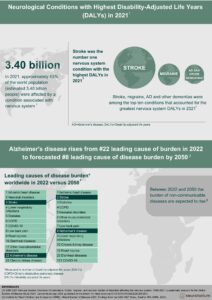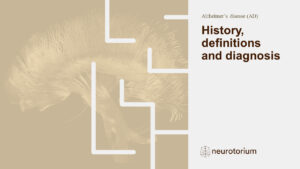Index for
slide deck
Introduction

Neurobiology and aetiology

Alzheimer’s disease research timeline
Diagnosis of AD has developed from a pathological approach to a more clinical and exclusionary approach.1,3 NIA-AA Criteria published in 2011, combined with a clinical and biological approach developed by the International Working Group (IWG), allowed for the emergence of…

Alzheimer’s disease is not synonymous with dementia
References on slide:
1.Alzheimer’s Disease International website. Dementia facts and figures. Available at: https://www.alzint.org/about/dementia-facts-figures/. Accessed 1 June 2023.
2.Alzheimer’s Association website. What is dementia? Available at: https://www.alz.org/al…

Alzheimer’s disease is a neurodegenerative disease

What is neurodegeneration?
Aβ and tau pathology in AD results in neuroinflammation, mitochondrial dysfunction, metabolic dysregulation, and protein deficiency.1 The resulting neurotoxicity and disturbed neuroplasticity that occur lead to neurodegeneration.1 In vivo, neurodegeneration in AD is ident…
Risk factors

Risk factors

What factors are at play in Alzheimer’s disease?
While the most prominent risk factor for AD is increasing age, the disease develops as a result of several risk factors that converge.2 Environmental factors such as traumatic brain injury, ischemia, hypoxia, neurotoxins, infections, lifestyle, metabolic parameters, and c…

Genetic risk factors
The estimated heritability of AD is approximately 70%, and does not differ between sex.1,9 To date, 75 risk loci have been identified for AD and related dementias.8 Several studies in multiple ethnic groups have associated the APOE gene with familial-AD and sporadic late-…

Modifiable and non-modifiable risk factors for dementia

Modifiable lifestyle factors and prevention strategies
AD has a long prodromal phase, during which early prevention is important to slow progression of the disease.1 Psychosocial factors such as educational attainment and bilingualism work to enhance cognitive activity, processing, and intellectual capacities.1,3 Regular soci…

Accumulation of dementia risk factors over time
Maintaining good physical health in individuals with dementia is important for cognition.1 In early life (i.e., <45 years), lack of education has been associated with an increased risk of dementia.1 In middle life (i.e., 45–65 years), and not necessarily in later life (i.…





















